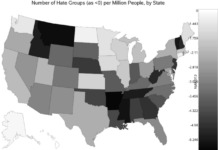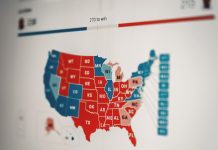The democratic process is not the democratic process when the vote is tampered with, and how that might occur is popular discussion these days with Voter ID and gerrymander in the news. Another way to bend the process is through closed election primaries that allow partisans to field an extremist candidate, restrict competition in the field, and hope for the best in general elections.
Open primaries occur when a state allows voting in either party’s primaries by voters, regardless of their registration. Generally, in open primary states, voters are prohibited from voting in both party’s primaries, but can participate in either. The advantages and disadvantages of open primaries are not always obvious. Some states that favor closed primaries feel pressure to include more people in the primary process with an eye toward more voter participation in government. Some don’t want more people in the process, so better control might be maintained by a strong party “base”.
A number of groups champion the open primary process, including Fairvote.org, a nationally focused organization, and Count My Vote in Utah. Fairvote.org maintains a list of the states and their policies, and if you don’t know which primary your state uses, it is a good resource.
Having a closed primary is a way for an extreme party base to ensure it gets a candidate to election. It works hand in hand with gerrymander, or the partisan redrawing of district lines, to bend the democratic process. A candidate too extreme for the majority in a state might not survive a challenge by a party moderate in general elections, but he could easily further his process and stay in the race longer with a closed primary, and hope for an upset or a scandal, to win the general election. Increasingly, with ultra-right wing candidates we see this strategy in elections.
There are variations in the open primary process, with some states favoring hybrids, and some states using a “Top 2” system that eliminates primaries in favor of a popular runoff. Louisiana uses a “Top 2” system and that gives the parties the least power in elections.
A recent Alabama primary saw a more extreme Tea Party candidate dumped in favor of a moderate in an open primary, and an upcoming Mississippi Senate race for incumbent Senator Thad Cochran’s seat might see the same. The open primary dynamic is usually not a problem in Deep South states as they tend to have large majorities of extreme conservative voters, with less to fear from moderates. As demographics change and the electorate becomes more diverse open primaries could eventually threaten more extreme candidates in these areas.
One of the more interesting options in open primary voting is for a party to use their vote for a defensive block, and moderate the other side’s candidate choice by one party diluting the other party’s primaries. This is a tradition in some places, especially when one’s own party choices do not make for much of a primary. Or, there are times when a possible candidate is so bad that it is most important to see him never make it past the primary stage. Voters in that position can use the open primary to their advantage.
Details can alter the effect of primary laws. Mississippi law prohibits a voter from voting in one party’s primary and then another party’s primary run-off. Some wording seems to suggest a voter should continue support for a candidate if the voter crossed over to vote in a primary, and that to prevent strategic gaming of primaries. A law was recently introduced into the Mississippi legislature to make one immune to cross-party primary voting restrictions if the person running were simply running for local office. This law sought to support the open-primary position by loosening the definition of when one was cross-party voting. It died in committee.
There is discussion about whether cross-party primary voting should be considered moral or ethically democratic. Popular consensus is that it is both moral and legal, especially if done with an eye to simply yield a more moderate elected official, as in the upcoming Mississippi race. In this race, Democrats and Independents might cross party lines to vote in the Republican primary with the essential goal to simply eliminate the most extreme Tea Party candidate, and an intention to retain a more moderate Republican incumbent. Since they would be voting with an eye to continue support of the Republican incumbent, there is nothing legally — or morally — wrong with that as a strategy. It is one solution to the prevalence of extremist candidates.
Edited by SS






